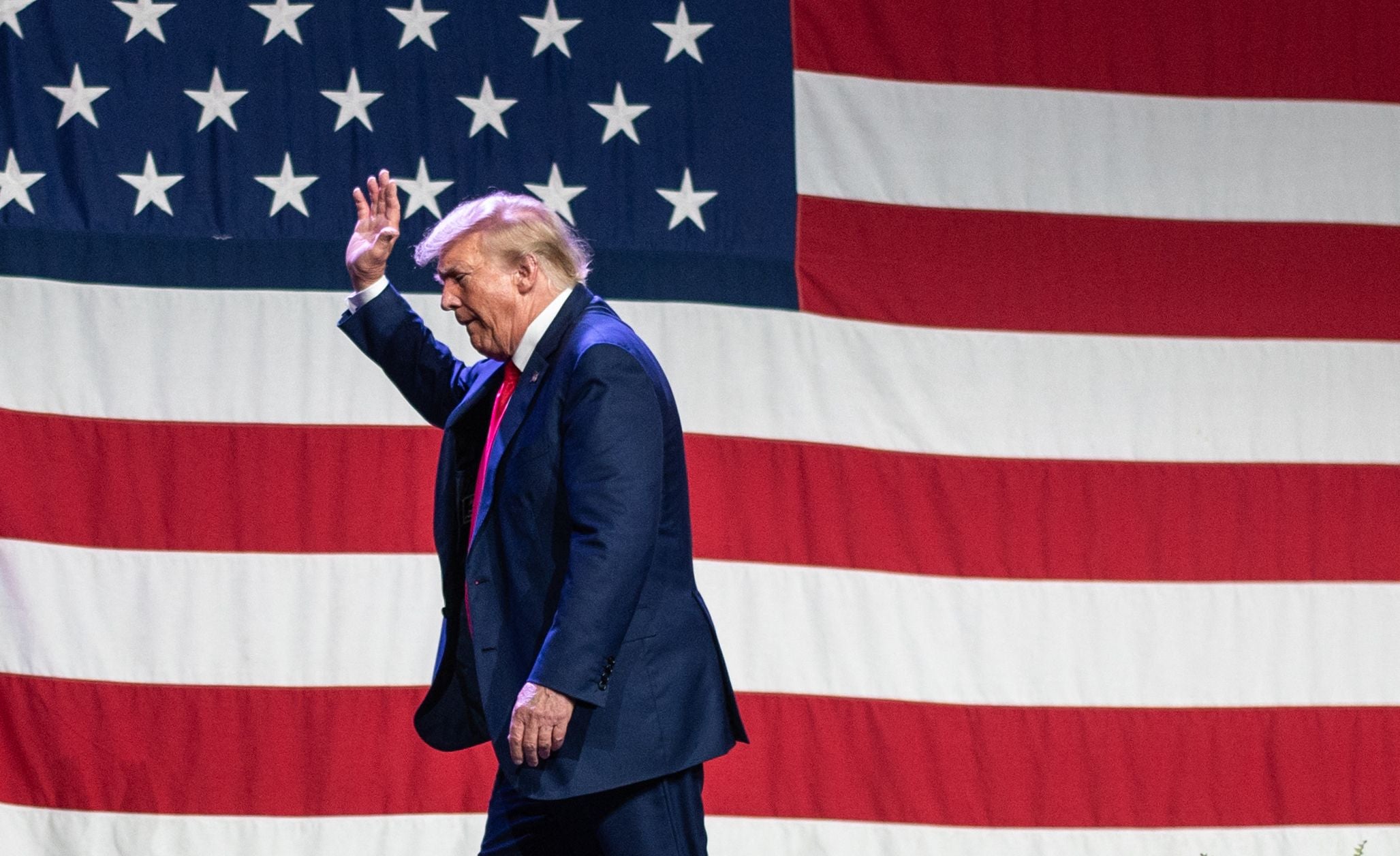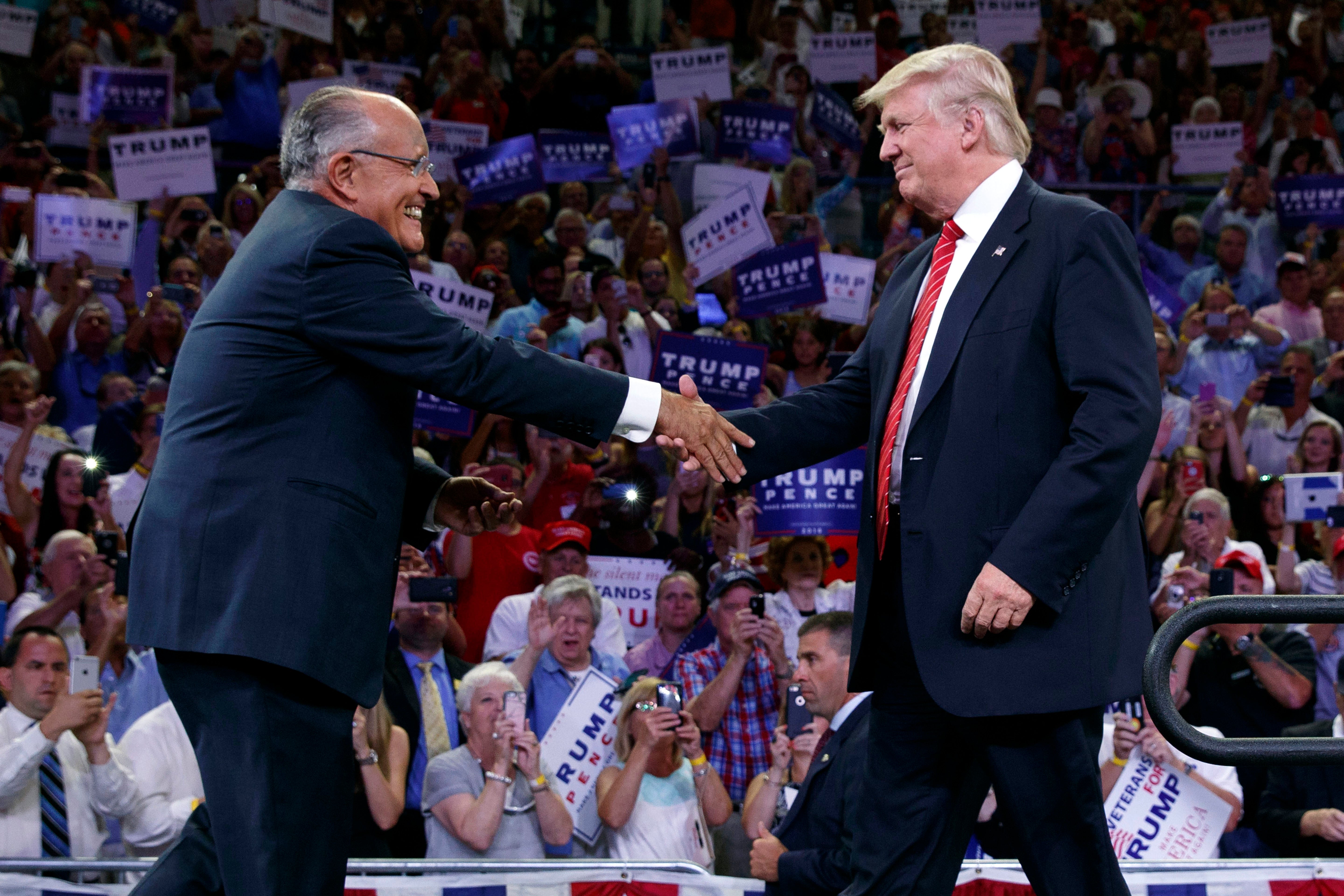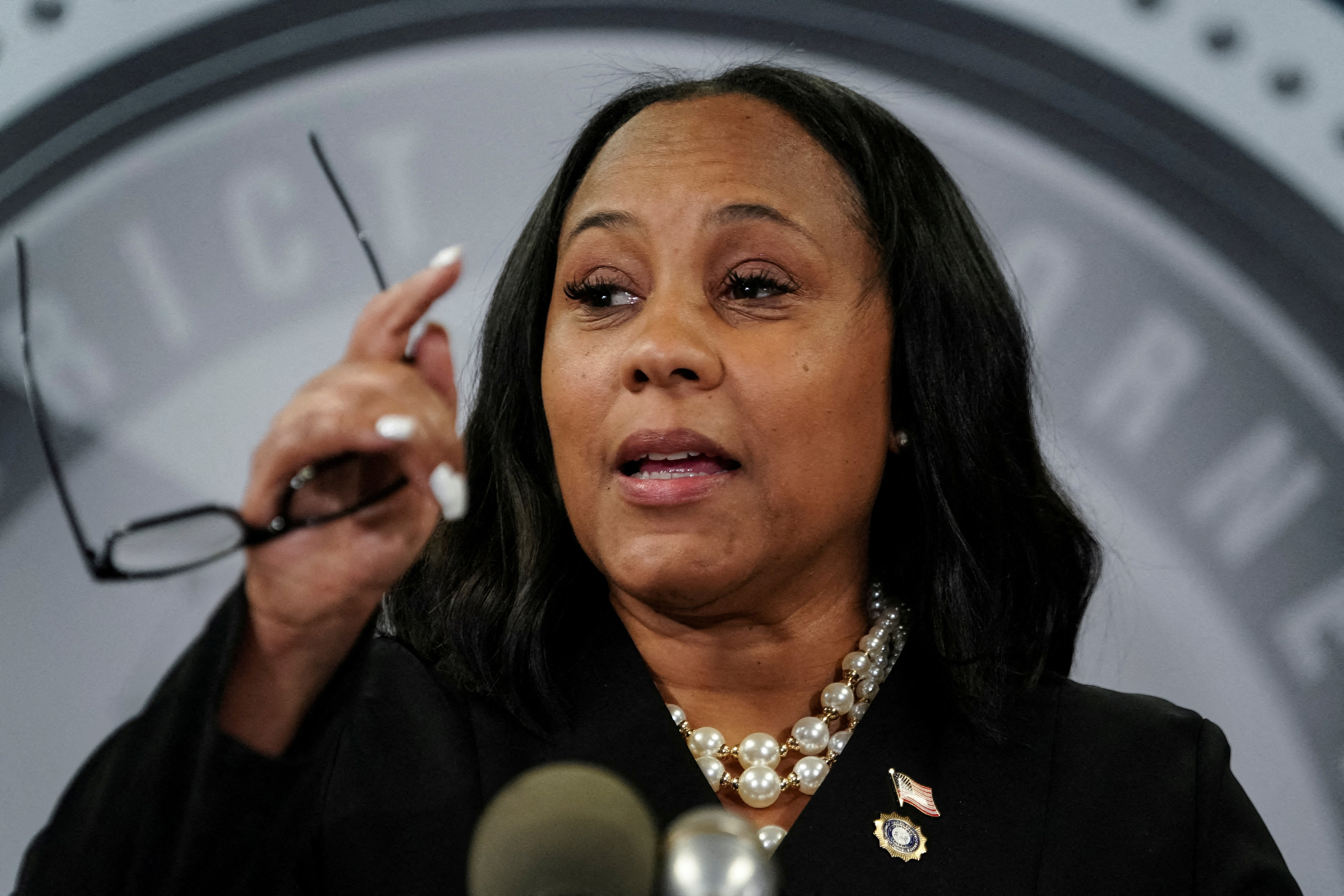Trump’s barely veiled ‘riggers’ dog whistle underlines former president’s history of racist statements
The former president’s ‘dog-whistle’ statements add to decades of racially driven attacks, Alex Woodward reports


Facing four criminal indictments as he seeks the Republican nomination for president, Donald Trump has repeatedly lashed out at the prosecutors and judges handling his cases, while his supporters spin volatile rhetoric into threats of political violence.
His inflammatory remarks, threats to political rivals and borderline incitement have galvanised his supporters, who echo and amplify his statements and hear his alleged dogwhistles loud and clear.
Mr Trump has repeatedly said he is the “least racist” person, but his statements surrounding the criminal cases against him are seen as some of his most explicit and most desperate racist attacks yet, following decades of bigoted statements.
He has labeled the three Black prosecutors handling civil and criminal cases against him animals, criminals and racists. After Fulton County District Attorney Fani Willis charged him and 18 of his allies in a sweeping criminal conspiracy case, the most detailed yet surrounding his attempts to subvert the 2020 presidential election, one that he falsely insists was stolen from him, he lashed out at “riggers” – widely heard as a racist bullhorn.

“Riggers” has long been used online and on social media platforms as a barely veiled racist slur against Black Democratic officials and voters. Shortly after Mr Trump use of the word, a flood of racist messages and targeted uses of the word filled far-right pro-Trump online forums and platforms.
“If anything illustrates the depths to which Donald Trump and his supporters have sunk in responding to his racketeering indictment in Fulton County, Georgia, it’s his reference to those he falsely accuses of voter fraud as ‘riggers,’” wrote National Urban League president Marc Morial in response to the former president’s statement.
“Trump has put a dishonest, racist and misogynistic spin on the old legal adage: If the law is against you, pound the facts. If the facts are against you, pound the law. If the law and the facts are against you, pound the table and yell like hell,” he added.
Prosecutors investigating the former president have been bombarded with harassing messages and violent threats, many of which are racist and antisemitic.
“Hay George Soros a****** puppet,” one message to New York County District Attorney Alvin Bragg said, referring to the Jewish philanthropist. “If you want President Trump come and get me. Remember we are everywhere and we have guns.”
Another called him “black trash” and “Aids Infested.”
Ms Willis received a message calling her the n-word and a “Jim Crow Democrat whore,” among many of the “equally ignorant voice mails coming in both to the county customer service and my office,” she said in a message to staff.
US District Judge Tanya Chutkan, who is overseeing a federal case surrounding Mr Trump’s alleged attempts to overturn election results, received a voicemail promising to “kill anyone who went after former President Trump” and calling her a “slave”. Ms Chutkan is Black.
“You are in our sights, we want to kill you,” Abigail Jo Shry said, according to federal prosecutors. “Trump doesn’t get elected in 2024, we are coming to kill you, so tread lightly, b**** … You will be targeted personally, publicly, your family, all of it.”
Police are also investigating online threats to members of the grand jury in Georgia after the former president’s supporters launched an apparent harassment campaign and posted jurors’ social media profiles, addresses and phone numbers on a far-right message board known for violence.
The former president’s rhetoric is often cited as an example of “stochastic terrorism,” in which an influential figure targets a person or group that sparks a captive audience to attack them while maintaining a degree of plausible deniability. Civil rights groups and current and former elected officials fear that unchecked calls for political violence from the man expected to receive a major political party’s nomination for president are a tipping point for American democracy.
The Independent has requested comment from Mr Trump’s campaign.
“It’s becoming all too commonplace to see everyday citizens performing necessary functions for our democracy being targeted with violent threats by Trump-supporting extremists,” former FBI investigator Daniel J Jones, who founded nonpartisan research group Advance Democracy, said in a statement. “The lack of political leadership on the right to denounce these threats – which serve to inspire real-world political violence – is shameful.”
Donald Trump’s history of ‘thinly veiled’ racism
The former president’s reliance on bigotry to retain his support from white voters is a “feature, not a bug,” said former White House aide and political commentator Keith Boykin.
In their failed efforts to overturn election results in states that Mr Trump lost in 2020, Mr Trump and his allies exclusively challenged counties with large Black and Latino populations while spreading bogus conspiracy theories about corruption and ballot irregularities and singling out two Black election workers.
Rudy Giuliani’s statements about Georgia election workers Ruby Freeman and Shaye Moss triggered a right-wing media campaign against them, including segments on Fox News, One America News and The Gateway Pundit, which published a story identifying Ms Freeman alongside photos falsely labeling her a “crook”. Threats from Mr Trump’s supporters soon followed.
Mr Giuliani, who faces a defamation lawsuit from both women after they experienced life-changing waves of abuse, will not contest that he made false statements about them. On his infamous call with Georgia’s chief elections official, Mr Trump called Ms Freeman a “professional vote scammer” and a “hustler.”
The account of Ms Freeman and Ms Moss is now central to the Georgia case implicating Mr Trump, Mr Giuliani and three others in an alleged scheme to pressure the women into going along with their bogus fraud narrative. But it follows a long history of alleged efforts from Mr Trump to bolster his own self interests while undermining Black Americans.
In 1973, the US Department of Justice sued Mr Trump and his father for their alleged refusal to rent apartments to Black tenants, with testimony revealing that applications from Black renters were marked with a “C” – for “coloured”. The Trumps settled the case, acknowledging that they “failed and neglected” to comply with the Fair Housing Act, but the agreement did not require them to admit to any instances of discrimination.
Then-Democratic presidential candidate Hillary Clinton addressed the case during a debate in 2016. Mr Trump said he had settled “with no admission of guilt.”
In 1989, Mr Trump took out a massive full-page newspaper ad demanding that five Black and Latino teenagers wrongly accused of raping a woman in Central Park should be killed.
“BRING BACK THE DEATH PENALTY. BRING BACK OUR POLICE!” read the statement in The New York Daily News on 1 May, 1989.
“I want to hate these murderers and I always will,” Mr Trump wrote at the time. “I am not looking to psychoanalyze or understand them, I am looking to punish them.”
Black leaders took out their own ad denouncing Mr Trump’s “thinly veiled racist polemic”
The Central Park Five – who were sentenced to prison sentences between five and 13 years – had their convictions vacated in 2002. The city paid the exonerated men $41m in 2014 to settle a civil rights lawsuit. Mr Trump has since refused to recant his statements or apologise.
In June 2019, with renewed attention on the case following the release of When They See Us on Netflix, a reporter asked Mr Trump outside the White House whether he ever would.
“You have people on both sides of that. They admitted their guilt. If you look at Linda Fairstein and if you look at some of the prosecutors, they think that the city should never have settled that case,” Mr Trump said, referring to one of the prosecutors in the case. “So we’ll leave it at that.”

Former Trump employee John O’Donnell also alleged a string of racist and antisemitic statements form his former boss in the 1991 book Trumped!: The Inside Story of the Real Donald Trump-His Cunning Rise and Spectacular Fall, in which Mr Trump is accused of calling laziness “a trait in Blacks.”
“I’ve got Black accountants at Trump Castle and at Trump Plaza. Black guys counting my money! I hate it,” Mr O’Donnell quoted Mr Trump as saying. “The only kind of people I want counting my money are short guys that wear yarmulkes every day.”
“The stuff O’Donnell wrote about me is probably true,” Mr Trump told Playboy Magazine in 1999. “The guy’s a f****** loser.”
In testimony before members of Congress in 1993, Mr Trump cast doubt on the legitimacy of Native Americans seeking to build casinos in the New York area, suggesting that their skin colour is evidence that they are faking their ancestry.
“They don’t look like Indians to me, and they don’t look like Indians to Indians, and a lot of people are laughing at it,” said Mr Trump, referring to Mashantucket Pequots who operate Foxwoods Resort Casino in Connecticut.
The state’s Hartford-Courant newspaper described Mr Trump’s remarks during the hearing as “one more grenade in an hourlong assault on Connecticut, Indians and their casinos that one committee chairman said was the most irresponsible testimony he had heard in nearly two decades in Congress.”
“Much of Trump’s testimony was unbelievable to the committee and other witnesses,” according to the report.
Mr Trump made similar inflammatory remarks during a radio interview with Don Imus that same year. “I think I might have more Indian blood than a lot of the so-called Indians that are trying to open up the reservations,” he said.
A complaint from the National Indian Gaming Association with the Federal Communications Commission described his comments as “obscene, indecent and profane racial slurs against Native Americans and African Americans.” The FCC called his remarks “deplorable” and “offensive.”
His niece Mary Trump, author of Too Much and Never Enough: How My Family Created the World’s Most Dangerous Man, also has accused her uncle of using the n-word and antisemitic slurs. “And I don’t think that should surprise anybody given how virulently racist he is today,” she told MSNBC. In an interview with Vanity Fair, Mr Trump’s former attorney Michael Cohen claimed that his longtime client once said that Black people are “too stupid” to vote for him and called a contestant on The Apprentice a “Black f**.”
Before he was a candidate running to be Barack Obama’s successor, Mr Trump elevated the bogus “birther” conspiracy theory movement accusing the nation’s first Black president of being born in Kenya. Mr Trump effectively became a spokesperson for the claims, propelling a soft pitch for a run for office while animating right-wing media and Republican politics leveraging racist hate to undermine then-President Obama.
Mr Trump ultimately retreated from the lie but has never apologised for it.
His remarks on the campaign trail and in the White House similarly pandered to far-right bigotry.
He told supporters that Mexico was sending rapists into the US, suggested that a judge should recuse himself from a case solely because that judge was of Mexican heritage, and initiated a ban on entry into the US from majority-Muslim countries as one of his first acts as president. Eight years later, Mr Trump praised anti-Muslim conspiracy theorist Laura Loomer.
In a meeting with a group of lawmakers in 2018, he reportedly asked “why are we having all these people from s***hole countries come here” when speaking about immigration from Haiti and African countries, then reportedly suggested the US should welcome more people from Norway instead. He also told a group of Black and brown lawmakers – most of whom were born in the US – to “go back” to other countries.
He also repeatedly invoked racist fears over racially integrated neighbourhoods, including celebrating his repeal of a fair housing rule to reduce housing disparities in suburbs. “I am happy to inform all of the people living their Suburban Lifestyle Dream,” he wrote on Twitter in 2020, “that you will no longer be bothered or financially hurt by having low income housing built in your neighborhood.”

At the onset of the Covid-19 pandemic in March 2020, racist anti-Asian rhetoric surged after Mr Trump labeled the disease the “Chinese virus,” a label that quickly took hold among other GOP officials. He would later call it “kung flu.” When he left the White House, he repeatedly used a racist nickname or some variation of “China-loving wife” on his Truth Social account to describe Elaine Chao, the first Asian American woman to serve in a presidential cabinet – Mr Trump’s.
His comments join a long list of statements that have fanned the flames of hate, fear and outrage among his supporters who have adopted Mr Trump’s grievances, from his depiction of “American carnage” in his 2017 inaugural address to his ongoing, false narrative that elections are “rigged” against him and “stolen” from him.
Within a 25-hour period in 2020, he wrote “when the looting starts, the shooting starts” to describe protests against police violence and promoted a video claiming that “the only good Democrat is a dead Democrat.” In a dark speech at the foot of Mount Rushmore on the Fourth of July that year, he declared that his political opponents want to “end America.” In campaign speeches on his path to the 2024 nomination, to applause from his supporters, he has warned his followers that the country will enter World War III if he is not elected, vowing “retribution” against their political opponents if he is.
A growing tolerance for political violence
Millions of Americans – roughly 4.4 per cent of the nation’s adult population – believe violence is justified to keep Mr Trump in the White House, according to a July report from the University of Chicago’s Project on Security & Threats research centre, reaching an alarming conclusion as the US enters 2024 elections. Violent support for the former president surged following his first federal indictment, the report found.
Similar studies have charted the widespread support for political violence and embrace of conspiracy theories in the wake of the January 6 attack.
A 2022 study published in American Politics Research determined that the former president’s supporters are at least partially driven by racism and xenophobia in their support for political violence.
Respondents of a survey who approved of Mr Trump were more likely to agree that “racial, religious or other minority groups are too demanding in their push for equal rights” and were also more likely to express negative attitudes towards immigrants. The findings “strongly suggest that an important component of the relationship between Trump approval and the normalization of political violence is, indeed, hate,” the researchers wrote.
Mr Trump’s supporters are also more likely to believe that racism against white people is a larger problem than racism against Black Americans, according to a July survey from Yahoo News and YouGov.
Among voters who supported Mr Trump in 2020, 62 per cent believe that racism against Black Americans is a problem today, but only 19 per cent described racism against Black Americans as a “big problem.” Twice as many – 37 per cent – claim that racism against white Americans is a “big problem”.
Trump voters and self-identified Republicans – which the report notes are overlapping but not necessarily identical cohorts – were the only demographic groups in the survey that are more likely to say racism against white Americans is a problem than to say the same about racism against Black Americans. Overall, 72 per cent of Americans believe racism against Black people is a larger problem than perceived anti-white prejudice.
The criminal cases surrounding the 2020 election – including a Michigan case targeting the fake elector scheme in that state – have underscored the outsized influence that formerly fringe, far-right movements and conspiracy theories often driven by racist grievances have played in American politics.
The conspiracy theories that animated an alleged plot to overturn the 2020 election are still driving restrictive voting laws and changes to election administration across the US, a movement that “continues to destabilize our election system and increase its vulnerability to sabotage,” according to Wendy Weiser, vice president for Democracy at the Brennan Center for Justice at NYU Law.
“Future historians will rely on Fulton County’s case, not the federal government’s, for the full story of one of the darkest chapters in American history,” Mr Morial said. “The meticulous work of Willis and her team is all the more remarkable given the constant abuse and threats of violence, incited by Trump, that his supporters have hurled at them.”







Bookmark popover
Removed from bookmarks